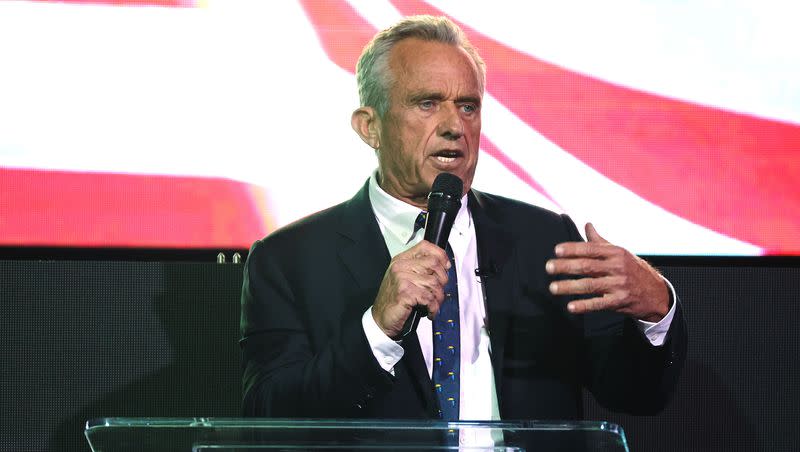Exclusive: Robert F. Kennedy Jr. denied Secret Service protection for 3rd time

- Oops!Something went wrong.Please try again later.
- Oops!Something went wrong.Please try again later.
- Oops!Something went wrong.Please try again later.
Independent presidential candidate Robert F. Kennedy Jr.’s third request for Secret Service protection has been denied, according to a letter obtained by the Deseret News.
The letter, signed by Department of Homeland Security Secretary Alejandro Mayorkas, says that USSS protection for Kennedy is “not warranted.” The letter’s veracity was confirmed Friday night by the Kennedy campaign.
“I have consulted with an advisory committee composed of the Speaker of the House, the House Minority Leader, the Senate Majority Leader, the Senate Minority Leader, and the Senate Sergeant at Arms,” Mayorkas wrote. “Based on the facts and the recommendation of the advisory committee, I have determined that Secret Service protection for Robert F. Kennedy Jr. is not warranted at this time.”
The Department of Homeland Security did not respond to a request for comment.
Related
Kennedy has submitted three requests for Secret Service protection since launching his campaign in April, each with the same result.
Federal law authorizes Secret Service protection for “major” presidential and vice presidential candidates. The DHS secretary is given authority to determine who qualifies as a “major” candidate, in consultation with the top congressional leaders in the House and Senate.
In 2017, criteria were established to help guide the DHS’ decision making, including a threat assessment conducted by the Secret Service to determine whether the candidate is in danger, and whether the candidate meets specific polling thresholds. For independent candidates, the threshold is “polling at 20% or more of the Real Clear Politics National Average for 30 consecutive days.”
Historically, Secret Service protection has been reserved for the two major-party nominees and their vice presidents, though others — like Herman Cain in 2012 and Ben Carson in 2016 — received protection just under one year before Election Day.
The Kennedy campaign has argued that Kennedy meets the criteria to receive protection. When it submitted its second request, Kennedy said he provided a 67-page report from Gavin de Becker and Associates, the security firm Kennedy hired, “detailing unique and well-established security and safety risks aside from commonplace death threats.”
In an interview with the Deseret News in October, Kennedy said he’s spent almost $2 million on private security. He called DHS’ decision “political,” saying it is “part of this trend of our enforcement agencies being weaponized to serve a political agenda.”
“I can’t look into the heads of the people who are making these decisions at the White House,” Kennedy continued. “But I think they’d probably rather me spend money on protection than spending it on field organization or advertising.”
Related
Kennedy launched his presidential campaign as a Democrat in April, before declaring he would run as an independent in October. Hypothetical general election polls of a three-way race between Kennedy, Trump and Biden consistently show Kennedy in the upper teens or low 20s in percentage of the vote.
Kennedy has built his campaign on a populist message, promising to fight “corruption” in Washington and cut government spending. An environmental lawyer, Kennedy garnered a significant following during the COVID-19 pandemic for his opposition to government shutdowns and vaccines.
As an independent candidate, the Kennedy campaign has to meet each individual state’s requirements to appear on the ballot. In Utah, Kennedy won a lawsuit to move the state’s filing deadline.
Both Kennedy’s father and his uncle — Sen. Robert F. Kennedy and President John F. Kennedy, respectively — were assassinated while in office. Kennedy has said he’s received death threats during his campaign, and in October, a man was arrested twice in one day while trying to break into Kennedy’s home. In September, a man at one of Kennedy’s campaign events was arrested for pretending to be a U.S. marshal and carrying a loaded firearm.
Kennedy is preparing to submit a fourth request for protection to the DHS, a person close to the Kennedy campaign confirmed.

